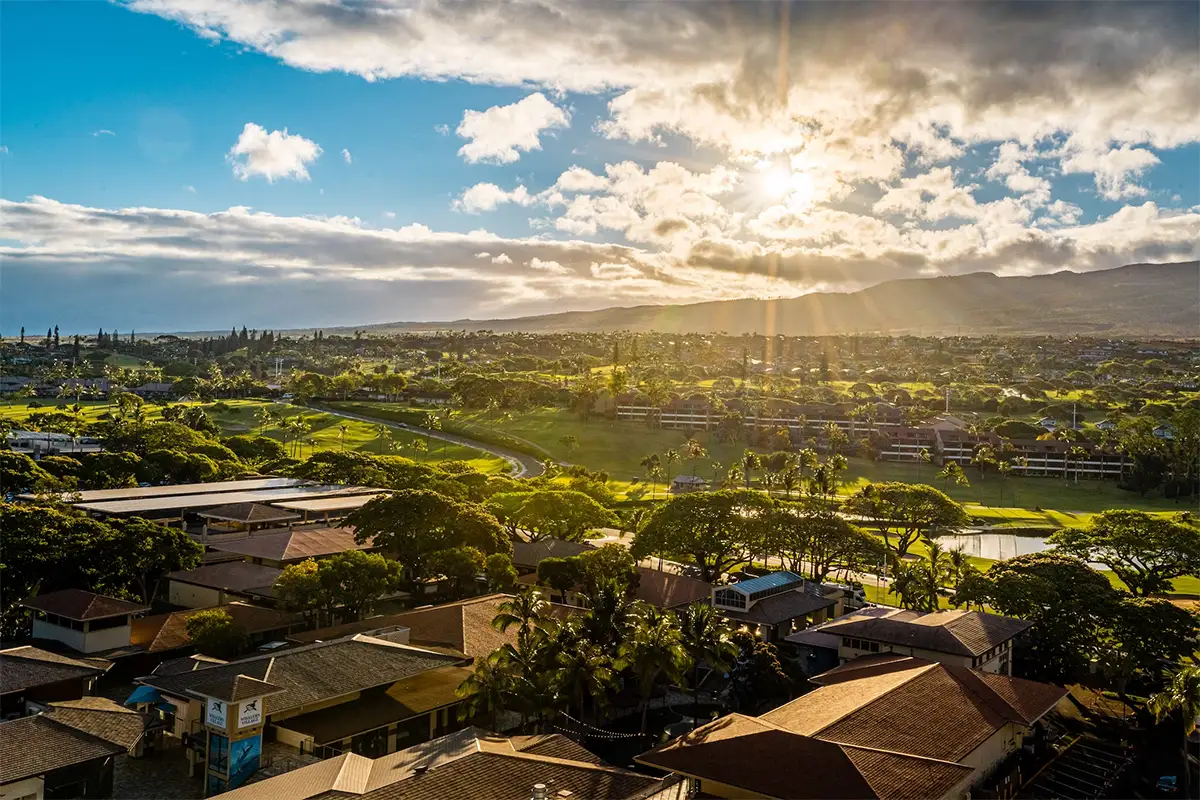 Hawai'i Journalism Initiative
Hawai'i Journalism InitiativeCampaign contributions show what’s at stake in Maui County Council elections

The thousands of campaign donations flowing into local races this year provide a window into the closest contests and the key issues the Maui County Council will be considering, including a hot-button proposal to ban certain short-term rentals.
So far this election cycle, the most heavily funded candidate has been incumbent Council Member Tom Cook, who is in a tight reelection contest for the South Maui seat against former Council Member Kelly Takaya King. Cook narrowly edged King by 144 votes in the Aug. 10 primary, with a third candidate.
HJI Weekly Newsletter
Get more stories like these delivered straight to your inbox. Sign up for the Hawai‘i Journalism Initiative's weekly newsletter:
Cook had received $170,440.84 in contributions as of Oct. 21, far outpacing the next-closest candidate by nearly $100,000, according to campaign spending reports filed last week. He’d also put the most money into his campaign of all council candidates with $160,049.48 in expenditures.
King, by comparison, has received a total of $34,942.72 in contributions and spent $44,226.80.
“I’m grateful for the contributions I’ve gotten,” Cook said. “I think that I’ve gotten them because people recognize that at my age and my life experience and my commitment to the island, that I just really roll up my sleeves and contribute the most I can. So, money and contributions don’t buy you influence in Hawai‘i. Maybe on O‘ahu, maybe other places, but not on Maui.”
But Maui County has had its share of corruption investigations in recent years — including former Maui Senator J. Kalani English, who was convicted in 2022 for accepting bribes to influence legislation, and former Environmental Management Director Stewart Stant, who last year was sentenced to 10 years in federal prison for taking $2 million in bribes to steer contracts toward a Honolulu businessman.
Cook acknowledged the recent scandals and said “that paints a really ugly brush on everybody,” but pointed out that he voted in favor of a charter amendment on this year’s ballot that would provide full-time staff for the Maui County Board of Ethics to help investigate and prosecute ethics violations.
“I’m a big advocate of being able to hold people accountable promptly in office,” he said.
But one of the groups supporting King and other Maui ‘Ohana Candidates who eschew special-interest donors says it’s concerned about the influence of big money in the elections, particularly funds coming from the Mainland.
“This recent massive influx of campaign finance money from corporations, super PACs funding council candidates and incumbents, Tasha Kama and Tom Cook, is a threat to fair elections and undermines democratic ideals we strive to uphold,” said Ann Pitcaithley, a volunteer with the Maui Pono Network that funds advertising for ‘Ohana Candidates. “People concerned about big money and politics may feel like their voice will not be heard, and that a candidate will be obligated to answer to the agenda of their campaign donors.”
While Maui County Council races are nonpartisan, recent elections have turned into contests between candidates depicted as progressive, small-money and pro-environment and candidates depicted as moderate or conservative, well-funded and pro-development. Both sides have in the past tried to shake their images and broaden their appeal.
Groups like the Maui Pono Network are backing a slate of ‘Ohana Candidates that they say serve “people and ‘āina, instead of ‘big money’ interests.” They include current council members Tamara Paltin, Keani Rawlins-Fernandez, Shane Sinenci and Gabe Johnson, who make up a minority of the nine-member council.
Labor unions, businesses and super PACs like the construction industry-backed For a Better Tomorrow are pushing candidates that they believe will support much-needed affordable housing. They include current council members Cook, Tasha Kama, Alice Lee, Yuki Lei Sugimura and Nohe U‘u-Hodgins.
The Maui Pono Network is honed in on incumbents like Cook and Kama because their races are likely to be close in Tuesday’s general election and because For a Better Tomorrow has invested heavily in advertising for both candidates, though it’s not allowed to coordinate directly with them. Campaign spending records show the super PAC put a little more than $171,200 toward digital, radio and mail advertisements for Kama from September to October, as well as nearly $104,000 for Cook.
The fact that Cook is tops in donations also is a reflection of how critical the South Maui race is. Cook’s biggest donors include businesses, labor unions, developers, resorts and private individuals. Many who gave the maximum single contribution of $2,000 are based in Hawai‘i, such as ILWU Local 142, Keoni Gomes of TJ Gomes Trucking, Dexter Kubota of Bowers + Kubota Consulting and Hawaii Realtors PAC.
Many donors are also from out of state and include Robert Morgado, a private investor on the East Coast who funded the Maui Arts & Cultural Center’s Morgado Hall, and Alex Fielding, the California-based CEO of Privateer Space who helped bring charging and Wi-Fi stations to Maui after the fire.
Cook, a general contractor, said some of his Mainland donors are people he built homes for in the past. He said he appreciates the donations but that he doesn’t owe them anything “except to serve the community as a whole.”
King’s largest donations of $2,000 primarily came from private individuals in her district, including Kīhei resident Gary Passon, Kīhei resident Lili Townsend, Kīhei developer Raymond Phillips and Kīhei bed-and-breakfast owner Charlene Schulenberg, who was also Mayor Richard Bissen’s campaign manager in 2022 when King ran for mayor. King also received $1,000 each from musician Willie Nelson and his wife Annie, who live in Pā‘ia.
The Kahului race also has the potential to be a close contest. The last time Kama and opponent Carol Lee Kamekona faced off was in the 2020 general election when Kama secured 41.9% of the vote to Kamekona’s 38.6%. There were nearly 14,000 blank votes, which could have decided a race that Kama won by roughly 2,800 votes.
Kama has received the fifth-most contributions among council candidates with $59,675. She has also spent $47,746.23. Kamekona has brought in $14,453.61 and spent $9,925.09.
“My top donors are in the business of building homes,” Kama said. “They are the ones building the needed housing this county is in such deep need for. Without these homebuilders we would not have the homes for our medical workers, our educational employees, or even our fire victims. Also they are employing and paying top wages for their employees to someday purchase a home and stay here on Maui.”
Kama pointed out that Mainland organizations are free to contribute to local races, and that if voters are opposed to that, then state law would have to be changed.
Kama’s top donors include developers of both affordable and luxury housing. For example, three officials with Maui-based Dowling Co., whose projects include Hawaiian Homelands housing, donated $2,000 each. Maui Tropical Plantation, which is owned by Mike Atherton, the developer of the 1,500-unit Waikapu Country Town project that will feature affordable and market-rate homes, donated $2,000. Ledcor Development, which has offices in Hawai‘i and the Mainland and is planning a 1,500-acre resort community in Wailea, donated $2,000. Those same donors also gave to Cook.
Kamekona’s top donors included $1,000 from Genesis Young and Sulara James, founders of the Hale Pono youth shelter in Wailuku. She also received $1,000 each from Mike Williams and Douglas Ballard, board members for Maui Tomorrow, which has worked to stop luxury development on open spaces. Maui Pono Network also donated $705 in banners. Many of the same donors also gave to other Maui ‘Ohana Candidates.
“My campaign has always been rooted in the promise to serve our local working families, not the interests of wealthy outsiders,” Kamekona said. “Early in my campaign, I made a clear pledge to reject special interest money and prioritize policies that truly uplift our residents. Every donation I’ve accepted reflects that commitment and aligns with my beliefs and values.”
Reports show ‘Ohana Candidates tended to have fewer donations, spending and cash on hand. The top contributions in all council races were to non-‘Ohana incumbent candidates — Cook with $170,440.84, Sugimura with $78,905.96, U‘u-Hodgins with $71,174.58, Lee with $59,932.48 and Kama with $59,675.
The donations also highlighted one of the biggest issues the council will consider in the coming term — the mayor’s proposal to ban short-term rentals in apartment districts.
Multiple tourism-related organizations and political action committees have contributed to non-‘Ohana Candidates, including Lanai Resorts and the Maui Hotel and Lodging Association PAC. The American Resort Development Association Resort Owners’ Coalition (ARDA-ROC) PAC, a Washington-D.C.-based lobbyist for vacation rental owners, and Turo, the San Francisco-based peer-to-peer rental car company, have also invested thousands.
When asked about ARDA’s interest in local races, Justin Vermuth, senior vice president of state government affairs and ARDA-ROC, said in a statement that “ARDA is deeply connected to the Maui community.”
“There are 31 timeshare resorts employing thousands of residents on Maui, and we work with local officials to promote a community-balanced approach to tourism, local housing, and economic sustainability that benefits both residents and visitors alike,” Vermuth said.
Cook, who received $2,000 from ARDA, said “no contribution to me influences my decision.”
“As a contractor … I’m for hire, I’m not for sale,” he said. “I’m supportive of modifying tourism so that it’s more of a visitor industry instead of importing people to buy second homes.”
Lee, who received $2,000 from Turo and $1,000 from ARDA, said it won’t influence her decision because she’s already made up her mind that short-term rentals should be phased out “in a legally sound way” that gives owners ample notice.
“Our entire council has been consistent in eliminating illegal units and controlling and reducing the number of short-term rentals from the very beginning,” Lee said. “And so for them to donate to me in spite of my record, you know, I think maybe they see that I try to make decisions in a logical way, in a reasonable way.”
Lee sees a large campaign chest as an indication of public support. She pointed out that many of her donations and endorsements come from unions, the working class that builds affordable housing.
“I’m sure they’ll draw conclusions about me and others of my ilk, you know, Yuki and Tasha and Tom and Nohe,” Lee said. “But if they can’t raise money, you know, I’d have to question that. Are they performing for the public as they should?”
The Hawai‘i Journalism Initiative reached out to all council candidates for comment.





